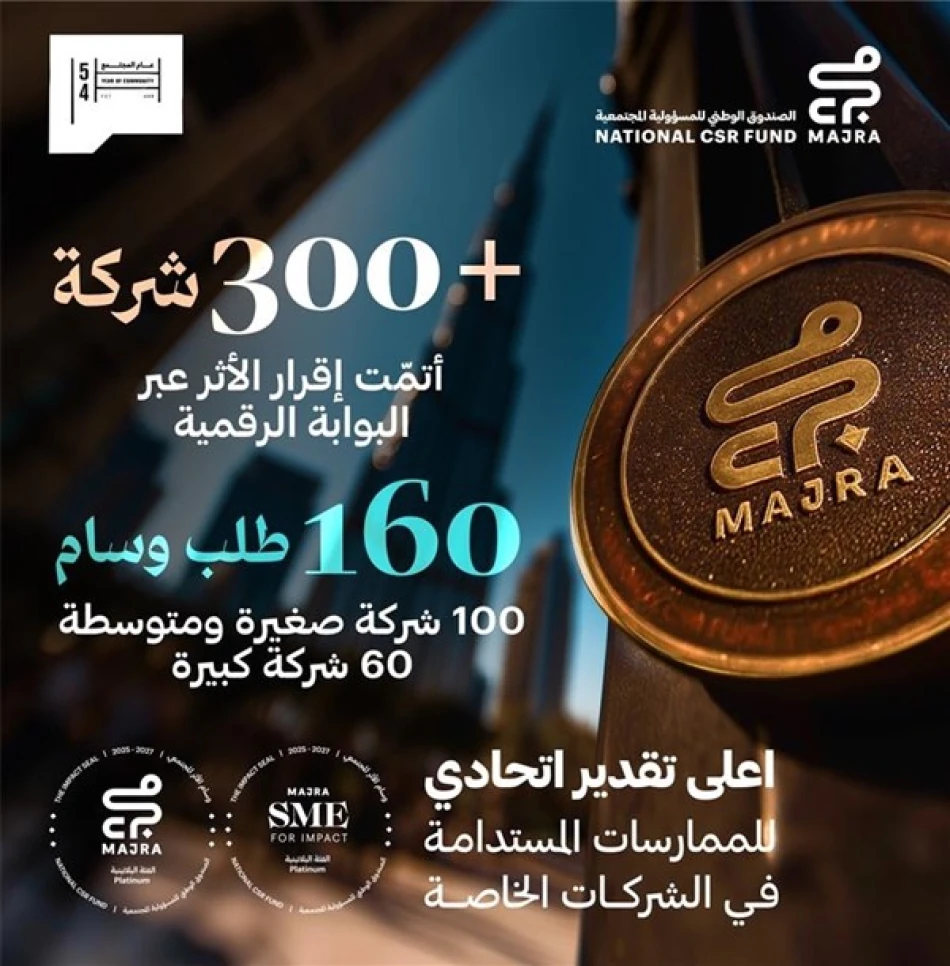
Over 300 Companies Complete 'Institutional Impact Assessment' in Saudi Arabia's 'Majra' Initiative
UAE's Corporate Social Responsibility Revolution: 300 Companies Embrace Mandatory Impact Reporting
The UAE is cementing its position as a global leader in corporate accountability with 300 companies completing mandatory "Institutional Impact Declarations" through the country's unified digital platform. This milestone signals a fundamental shift toward measurable corporate responsibility that could reshape business practices across the Gulf region and beyond.
Digital-First Approach to Corporate Accountability
The National Fund for Corporate Social Responsibility, known locally as "Majra," has successfully onboarded these companies through its Digital Gateway for Sustainable Impact – a federal platform that standardizes how businesses document their institutional impact. This isn't merely voluntary reporting; it's a mandatory preliminary step for companies seeking the coveted "Social Impact Medal" certification.
The declaration process requires companies to demonstrate compliance across environmental, social, and governance (ESG) criteria while documenting concrete contributions to Emirati society through financial support, in-kind donations, or volunteer initiatives.
Private Sector Responds with Unprecedented Engagement
The numbers tell a compelling story of corporate buy-in. Majra has received approximately 160 applications for the second round of Social Impact Medal certification, with a notable split: 100 applications from small and medium enterprises (SMEs) and 60 from large corporations.
This distribution suggests the UAE's approach is successfully engaging businesses across the economic spectrum, rather than just targeting multinational corporations with existing sustainability departments.
SME Participation Signals Broader Cultural Shift
The heavy participation from SMEs – traditionally less engaged with formal ESG reporting – indicates that corporate social responsibility is becoming embedded in the UAE's business culture rather than remaining a luxury for large enterprises. This grassroots adoption could accelerate the country's sustainability goals more effectively than top-down mandates alone.
Strategic Positioning in Global ESG Landscape
Sarah Shaw, CEO of Majra, emphasized that growing corporate engagement reflects "serious commitment from the private sector toward more transparent and responsible practices." This aligns with global trends where investors increasingly demand measurable ESG performance, but the UAE's centralized, government-backed approach offers advantages over fragmented voluntary initiatives seen elsewhere.
Unlike the European Union's complex Corporate Sustainability Reporting Directive or the United States' patchwork of state-level requirements, the UAE has created a unified federal platform that could serve as a model for other emerging markets seeking to rapidly scale corporate accountability.
Investment and Market Implications
For investors and multinational corporations, the UAE's systematic approach to corporate responsibility measurement creates several strategic advantages. Companies operating in the Emirates now have clear, standardized metrics for demonstrating social impact – crucial for accessing ESG-focused capital and meeting international reporting requirements.
The platform's digital-first architecture also positions the UAE ahead of regional competitors like Saudi Arabia and Qatar, where corporate responsibility initiatives remain more fragmented. This could influence foreign direct investment decisions as companies seek jurisdictions with mature sustainability frameworks.
Beyond Compliance: Building Competitive Advantage
The UAE's vision extends beyond mere regulatory compliance toward making corporate social responsibility a "sustainable institutional practice" within the private sector. By transforming development commitments into measurable contributions, companies can demonstrate tangible value creation rather than simply checking boxes.
This approach could prove particularly valuable as global supply chains face increasing scrutiny from consumers, regulators, and investors. Companies with verified social impact credentials through the UAE system may find themselves better positioned in international markets where sustainability performance increasingly drives purchasing and partnership decisions.
Most Viewed News

 Layla Al Mansoori
Layla Al Mansoori






